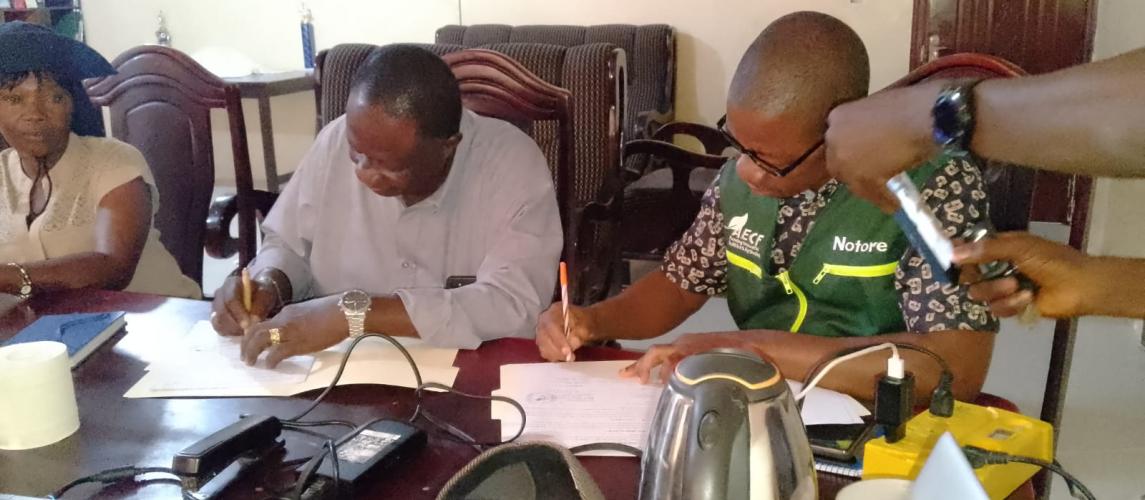
RESADE/CARI Project Launches Landmark Agricultural Innovation Hub in Grand Bassa, Signs MOU with Grand Bassa University
BUCHANAN, Liberia – In a bold step toward transforming Liberia’s agricultural sector, the RESADE/CARI Project has commissioned the construction of a landmark Best Practice Hub (BPH) in Buchanan, Grand Bassa County. Designed as a center for innovation, training, and empowerment, the hub will serve both farmers and students, offering hands-on exposure to modern agricultural technologies and sustainable practices.
The initiative, led by the “Improving Agricultural Resilience to Salinity through Development and Promotion of Pro-poor Technologies” (RESADE), is a four-year project funded by the International Fund for Agricultural Development (IFAD) and the Arab Bank for Economic Development in Africa (BADEA). The Central Agricultural Research Institute (CARI), in partnership with the Project, aims to bridge the gap between research and practical application in the field.
During a formal engagement with the Grand Bassa University (GBU) administration, Dr. James S. Dolo, National Coordinator of the RESADE/CARI Project, provided a comprehensive overview of the BPH’s objectives, achievements, and challenges. He emphasized the hub’s dual role as a training ground for farmers and a research platform for students studying agriculture and food sciences.
Once completed, according to Dr. Dolo, the BPH will provide training in modern farming techniques, including the use of climate-smart practices, small farm machinery, and post-harvest technologies. Through Train-the-Trainer (ToT) programs, local farmers will be empowered to share knowledge with their peers, ensuring sustainability and widespread adoption of best practices.
He emphasized that the hub will be equipped with essential tools, pointing to power tillers, threshers, seed cleaners, and vacuum packaging machines, which are already on the ground, to enable farmers to increase productivity and reduce post-harvest losses. “These machines will be used for both demonstration and practical field applications by farmer organizations to support the first Community Seed Bank in the county,” Dr. Dolo noted.
Dr. Dolo also introduced Dr. Arthur Bob Karnuah, Director General of CARI, who reaffirmed the institute’s commitment to long-term collaboration with GBU. Dr. Karnuah highlighted the importance of integrating salinity considerations into the hub’s design, given the proximity of the Benson River, which carries saltwater from the Atlantic Ocean.
He further pledged to deploy CARI’s top-notch research assistants and officers to support students in research proposal writing and field experimentation. “CARI is committed to institutional continuity and knowledge-sharing that transcends leadership changes,” Dr. Karnuah stated.
The event culminated in the signing of a Memorandum of Understanding (MOU) between CARI and GBU. Dr. Karnuah signed on behalf of CARI, while Dr. Arnold Hill, Head of GBU’s Management Team, signed on behalf of the university president. Dr. Hill welcomed the partnership, noting its long-term impact on agricultural education and innovation in Grand Bassa County.
He praised the College of Agriculture’s contributions since 2012 in producing professionals now serving across Liberia and expressed confidence that the BPH would bring immense academic and research opportunities to the university and the region.
Kusee L. Armstrong, Team Leader of Creative Urban Construction, the firm contracted to build the hub, expressed gratitude for the opportunity to contribute to Liberia’s first agricultural best practice center. He committed to completing the project within 52 days, including 14 days of intensive day-and-night work shifts, ensuring both quality and timely delivery.
“We are honored to be part of this transformative initiative that directly benefits students and farmers,” Armstrong said.
The MOU between CARI and GBU strengthens a strategic partnership aimed at ensuring the hub’s long-term sustainability and relevance. The BPH complements Liberia’s broader national vision for agricultural innovation, education, and infrastructure development.
The visit to Buchanan also included the distribution of quality seeds to local farmers, reinforcing the project’s commitment to improving access to certified planting materials. The event featured strategic planning sessions and institutional dialogue, laying the groundwork for a transformative agricultural future in Grand Bassa County.
As Vice President Moses Bull aptly stated during an earlier engagement, “This initiative goes beyond research; it is a foundation for agricultural self-sufficiency and practical education.”
